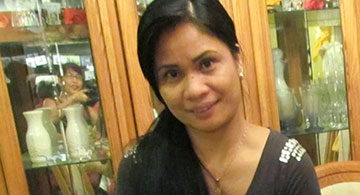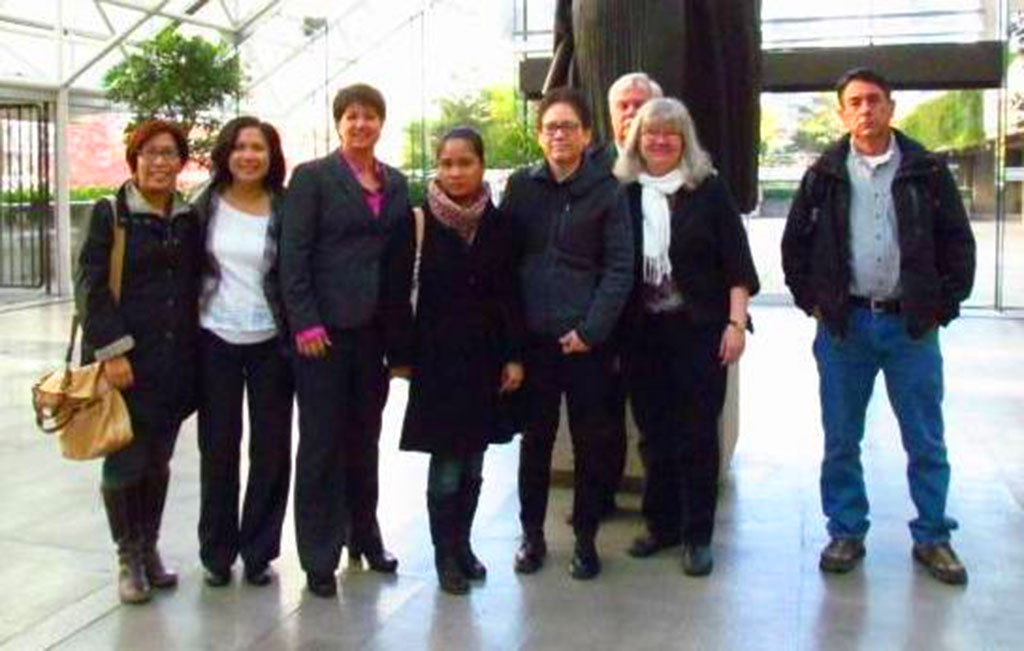On June 5th Leticia Sarmiento passed away from brain cancer at a hospital in Burnaby, BC. Letty, as many called her, was at the center of a landmark human trafficking case and was the first to win such case in Canada. Letty was 41 years old at the time of her death.
Letty came to Canada with her employer in 2008 from Hong Kong. After a physical altercation in June 2010 involving her female employer, Nicole Huen, Letty made the decision to call the police. Prior to the altercation, when she arrived in Canada, she was forced to work 16 hours per day, seven days a week taking care of a child and cleaning the house. She was also barred from talking with other nannies. The police took her to a shelter and found out that she was working without a proper work permit. It was discovered that her employer brought Letty to Canada on a six-month visitor visa. They never got a proper work permit for her.
The case took over two years. She got support from the Filipino community and different organizations like Migrante BC where she became a member. On October 2013 her male employer,Franco Orr, was convicted and sentenced for keeping Leticia in “domestic servitude” in the province of British Columbia for two years. His sentence was “18 months in jail for human trafficking and six months for employing a foreign national illegally and misrepresenting facts”.
Like many caregivers that cometo Canada, Lettyleft her family to go abroad in the hopes of providing them with a better life. Letty eventually got her permanent resident visa and became active in our community in Vancouver. With permission, I’m sharing the reflections of Beth Dollaga, her fellow Migrante BC member.
 A Face with a Name: Leticia “Letty” Sarmiento
A Face with a Name: Leticia “Letty” Sarmiento
March 17, 1973 – June 5, 2018
Margaret Atwood, a celebrated Canadian author once wrote: “You don’t tell a story only to yourself. There is always someone else. A story is like a letter…Dear YOU, I’ll say. Just YOU, without a name.
Attaching a name attaches you to the world of facts, which is riskier, more hazardous. Who knows what the chances are out there, of survival, YOURS? I will say YOU, YOU like a new story, an old story. YOU can mean more than one. YOU can mean thousands.”
In August 2010, in one of Migrante BC’s community outreach, I met a stranger who would later become a friend. I am attaching a name to my story: Leticia Sarmiento or Letty to many of her friends. She was a daughter, a sister and, at the time of our meeting, was a young bride who soon found herself fighting to escape from an abusive relationship. She was a mother, a worker, a woman of courage and a friend.
Letty is one of the 1.5 million Filipinos found in over 230 countries in the world. Massive unemployment, landlessness, poverty and globalization have been forcing Filipino people to migrate.
In 2000, Letty left her three young children in the care of her mother to work as a domestic worker in Saudi Arabia. She worked there for four years and moved to Lebanon in 2004. In 2006, she had to flee Lebanon on foot along with other nationalities, trekking in the dessert for safety. She and other compatriots felt they were neglected by the Philippine government at a time they were fleeing the war. They were at the mercy of the Italian government service for rescue. Letty says she was lucky to make it home. Unfortunately, though she made it home alive, escaping from bombs and bullets, she was faced with unemployment and economic hardship. Again, Letty had to muster the courage to leave the country and endure the emotional tragedy of separation from her family to provide for their basic needs. She left for Hong Kong in 2006 as a domestic worker and was brought to Canada by her employer in 2008.
Leticia was a victim of human trafficking from Hong Kong to Canada, and her case led to the first conviction under Canadian law for such. Her trafficker eventually had the two serious convictions overturned at appeal. Migrante BC helped her resettle into Vancouver where eventually, her two young-adult children Mika and Mark were reunited with their mother.

It is not enough to tell stories. It is not enough to know someone else’s story. The story must weave into the stories of struggles of the people around the world. In the midst of these stories, there are people who know what it means to love and to care, to dare to take a step in an organized action, and fulfill the promise of a better tomorrow for everyone.
Letty, kabsat, sister, thank you for the opportunity to know you and to learn from you. Thank you for being part of my personal journey. REST IN POWER and in PEACE!
*Letty passed away at 5:40pm (PST) at St. Michael’s Hospice in Burnaby, BC.



